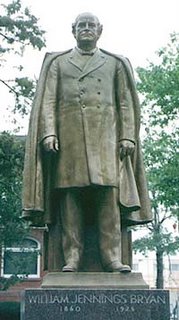
I came across a great quote tonight and wanted to share it.
"Society has become accustomed to some very nice distinctions. A poor man is called a socialist if he believes that the wealth of the rich should be divided among the poor, but the rich man is called a financier if he devises a plan by which the pittance of the poor can be converted to his use. The poor man who takes property by force is called a thief, but the creditor who can, by legislation, make a debtor pay a dollar twice as large as he borrowed is lauded as the friend of sound currency. The man who wants the people to destroy the Government is an anarchist, but the man who wants the Government to destroy the people is a patriot."
- William Jennings Bryan.
Remembered today, when remembered at all, as the lampooned creationist champion in Inherit the Wind, Byran was also the great champion of the common man in the late 1800s, when Republicanism ran rampant. I am being treated to a new and very different view of the "Boy Orator of the Platte" by the authors of The Growth of the American Republic.
Published in 1932, for a time, this work was a standard American History text. It is fascinating to go back and read of this Great Crusader for the Common Man, as presented by two old-fashioned 1930s Liberals and to hear the words of Populism ringing in your ears once again...
"On the one hand, stand the corporate interests of the United States, the moneyed interests, aggregated wealth and capital, imperious, arrogant, compassionless...On the other side stand an unnumbered throng, those who gave to the Democratic party a name [this is exactly why Republicans like to drop the "ic" from the end of the name: Bryan haunts them to this day-AB] and for whom it has assumed to speak. Work-worn and dust begrimed, they make their mute appeal, and too often find their cry for help beat in vain against the outer walls, while others, less deserving, gain ready access to legislative halls."
And here, from the "Cross of Gold Speech" which was the question you missed on the test in eighth grade history class, is another fine quotation...
"When you come before us and tell us that we are about to disturb your business interests, we reply that you have disturbed our business interests by your course.
We say to you that you have made the definition of a business man too limited in its application. The man who is employed for wages is as much a business man as his employer; the attorney in a country town is as much a business man as the corporation counsel in a great metropolis; the merchant at the cross-roads store is as much a business man as the merchant of New York; the farmer who goes forth in the morning and toils all day, who begins in the spring and toils all summer, and who by the application of brain and muscle to the natural resources of the country creates wealth, is as much a business man as the man who goes upon the Board of Trade and bets upon the price of grain; the miners who go down a thousand feet into the earth, or climb two thousand feet upon the cliffs, and bring forth from their hiding places the precious metals to be poured into the channels of trade are as much business men as the few financial magnates who, in a back room, corner the money of the world. We come to speak of this broader class of business men. "

When the modern world seems bereft of stirring voices, it never hurts to open up a book and harken to the words left by those who have partaken in history's great pageant- those words are often more prescient than one might expect.

 If you like Rip and Read, check out
If you like Rip and Read, check out
2 comments:
I really enjoyed this post, Alex. I tend to find more truth in the leaders, political and otherwise (Often Literary as Thoreau), of the past. There's more truth. One could argue to me that there is more truth in what men used to say because those were simpler times. I would call that man a fool. The amount of hardships in those days were by far more serious than today.
Humanity is forever preying on it's weaker classes; the rich on the poor, the intelligent on the incompitant, the business class on the working class.
Until we can find a way to realize, world wide, that there is a greater purpose than the big fish eating the smaller fish, I fear we will all suffer at the hands of Mankinds cruelty for the duration.
I realize this is a socialist view, and one many would call naive. That's fine.
But those nay sayers need to start looking beyond themselves and realize that when world leaders destroy liasons with other allied Countries, when world leaders seperate thier own Country down the middle by naming one action "Patriotism" and another action as simple as disagreeing with his or her world leaders as "Terrorism", that we are throwing our Country AND ourselves backwards by however many years it took to ally ourselves with those countries we are now departed from.
We don't HAVE world leaders anymore. We have big business men as our leaders and it's killing us one by one.
Thanks Ethan. What I find inspiring, when looking to the past, is the fact that, the problems of humanity never really change. Therefore, if you are unlucky enough not to have an great spokesman in your generation, you can turn to the past, and learn where to start.
Post a Comment